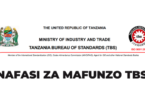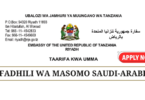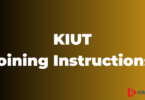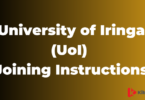Welcome to kibweta.com, our website. Are you trying to find the DIT Students Prospectus 2025/2026? Learn more about the Dar es Salaam Institute of Technology (DIT) admissions status, application process, cost, available programs and courses, and selection.
The Act of Parliament No. 6 of 1997 created the Dar es Salaam Institute of Technology (DIT), a Tanzanian institution for higher technical training. The goal of DIT is to become a preeminent provider of technical education in order to meet the demands of society. DIT’s goal is to deliver competency-based technical education by means of training, research, innovation, and the creation of suitable technology. DIT is a forward-thinking, customer-focused university that promotes industrialization.
Later, the college introduced Diploma in Engineering (DE) programs in the four traditional engineering specialties to provide post-FTC technical training. Courses in Laboratory Technology and Diploma in Technical Education (DTE) programs were introduced in 1962. DTC’s position in providing higher technical education was cemented in 1991 when the Diploma in Engineering (DE) courses were swapped out for the corresponding Advanced Diploma in Engineering (ADE) programs. Today, DIT, DE, and ADE graduates are employed by almost all engineering enterprises and organizations. Positive feedback from the appropriate employers demonstrates that ADE graduates have done well overall.
DIT is fully accredited by the National Council for Technical Education (NACTE). Currently, DIT offers a wide range of full-time and part-time professional applied sciences and engineering training courses and programs. The FTC and ADE programs have been replaced by the Institute’s Ordinary Diploma and Bachelor of Engineering degrees, respectively.
Along with a few master’s level programs, such as a Master of Technology in Computing and Communications, a Master of Engineering in Maintenance Management, a Master of Engineering in Computational Science and Engineering, and a Master of Engineering in Sustainable Energy Engineering, the Institute has also started to offer a Bachelor of Technology in Laboratory Sciences. Additionally, there are bachelor’s degrees in mining engineering and oil and gas, as well as certificate programs in biotechnology, food science and technology, multimedia and film technology, and information communication technology.
This prospectus provides a summary of the academic programs that DIT now offers as well as plans for the near future that will support the institute’s training goal. It also provides information on the rules and regulations controlling admittance to these programs and the associated expenses in chapters three and four, respectively. Chapter 5 contains the examination rules, which include every facet of the exams administered by the Institute for Ordinary Diploma, Bachelor Degree, and Master Degree programs—programs that result in the granting of NTAs 4–9 levels. Additional details on DIT’s master’s degree program provision procedures can be found in the postgraduate guidelines.
Please visit the DIT page for Prospectus PDF for additional information.
Read also: University of Iringa Online Admission System 2025-2026






